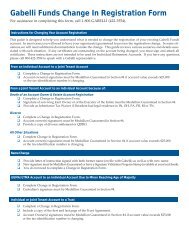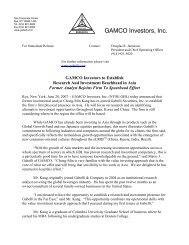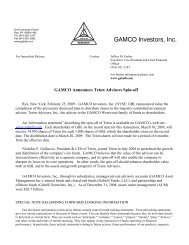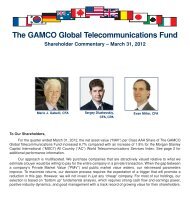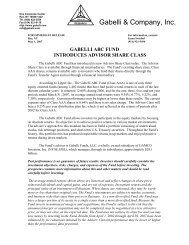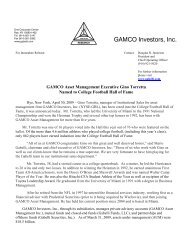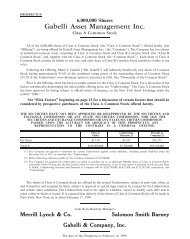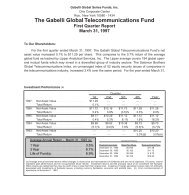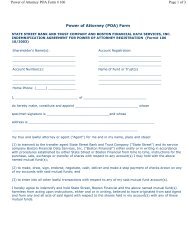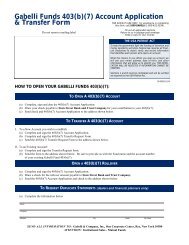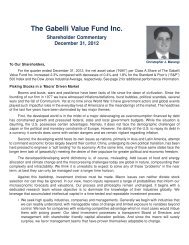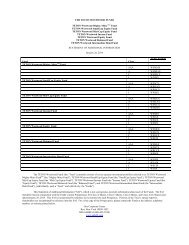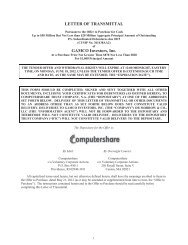FORM 10-K/A GAMCO Investors, Inc. - Gabelli
FORM 10-K/A GAMCO Investors, Inc. - Gabelli
FORM 10-K/A GAMCO Investors, Inc. - Gabelli
- No tags were found...
You also want an ePaper? Increase the reach of your titles
YUMPU automatically turns print PDFs into web optimized ePapers that Google loves.
REPORT OF INDEPENDENT REGISTERED PUBLIC ACCOUNTING FIRM ON EFFECTIVENESS OF INTERNAL CONTROL OVER FINANCIAL<br />
REPORTING<br />
The Board of Directors and Stockholders<br />
<strong>GAMCO</strong> <strong>Investors</strong>, <strong>Inc</strong>. and Subsidiaries<br />
We have audited management’s assessment, included in the accompanying Management’s Assessment of Internal Control Over Financial Reporting, that <strong>GAMCO</strong> <strong>Investors</strong>, <strong>Inc</strong>.<br />
and Subsidiaries (the “Company”) did not maintain effective internal control over financial reporting as of December 31, 2006, because of the effects of not having processes in<br />
place to ensure that individual assets and liabilities of certain investment accounts were presented in the consolidated financial statements on a gross basis and that non -routine<br />
transactions were appropriately evaluated and accounted for in accordance with U.S. generally accepted accounting principles, based on criteria established in Internal Control—<br />
Integrated Framework issued by the Committee of Sponsoring Organizations of the Treadway Commission (the “COSO criteria”). <strong>GAMCO</strong> <strong>Investors</strong>, <strong>Inc</strong>. and Subsidiaries’<br />
management is responsible for maintaining effective internal control over financial reporting and for its assessment of the effectiveness of internal control over financial reporting. Our<br />
responsibility is to express an opinion on management’s assessment and an opinion on the effectiveness of the Company’s internal control over financial reporting based on our<br />
audit.<br />
We conducted our audit in accordance with the standards of the Public Company Accounting Oversight Board (United States). Those standards require that we plan and perform<br />
the audit to obtain reasonable assurance about whether effective internal control over financial reporting was maintained in all material respects. Our audit included obtaining an<br />
understanding of internal control over financial reporting, evaluating management’s assessment, testing and evaluating the design and operating effectiveness of internal control, and<br />
performing such other procedures as we considered necessary in the circumstances. We believe that our audit provides a reasonable basis for our opinion.<br />
A company’s internal control over financial reporting is a process designed to provide reasonable assurance regarding the reliability of financial reporting and the preparation of<br />
financial statements for external purposes in accordance with generally accepted accounting principles. A company’s internal control over financial reporting includes those policies<br />
and procedures that (1) pertain to the maintenance of records that, in reasonable detail, accurately and fairly reflect the transactions and dispositions of the assets of the company;<br />
(2) provide reasonable assurance that transactions are recorded as necessary to permit preparation of financial statements in accordance with generally accepted accounting<br />
principles, and that receipts and expenditures of the company are being made only in accordance with authorizations of management and directors of the company; and (3) provide<br />
reasonable assurance regarding prevention or timely detection of unauthorized acquisition, use, or disposition of the company ’s assets that could have a material effect on the<br />
financial statements.<br />
Because of its inherent limitations, internal control over financial reporting may not prevent or detect misstatements. Also, projections of any evaluation of effectiveness to future<br />
periods are subject to the risk that controls may become inadequate because of changes in conditions, or that the degree of compliance with the policies or procedures may<br />
deteriorate.<br />
A material weakness is a control deficiency, or combination of control deficiencies, that results in more than a remote likelihood that a material misstatement of the annual or interim<br />
financial statements will not be prevented or detected. The following material weaknesses have been identified and included in management’s assessment. Management did not have<br />
adequate controls in place to ensure that there was a remote likelihood that a material misstatement of the annual or interim consolidated financial statements would be prevented or<br />
detected as it relates to: (1) the reporting of individual assets and liabilities of certain investment accounts in the consolidated financial statements on a gross basis and (2) the<br />
evaluation of and accounting for certain non-routine transactions in accordance with U.S. generally accepted accounting principles. These material weaknesses resulted in the<br />
misstatement of certain asset, liability and income statement accounts, and incomplete disclosures in the notes to the consolidated financial statements. The adjustments have been<br />
recorded in the annual consolidated financial statements as of and for the year ended December 31, 2006 along with the appropriate disclosures. These material weaknesses were<br />
considered in determining the nature, timing, and extent of audit tests applied in our audit of the 2006 consolidated financial statements, and this report does not affect our report<br />
dated March 16, 2007 (except for note A Restatement, as to which the date in August 8, 2007) on those consolidated financial statements.<br />
F-3



